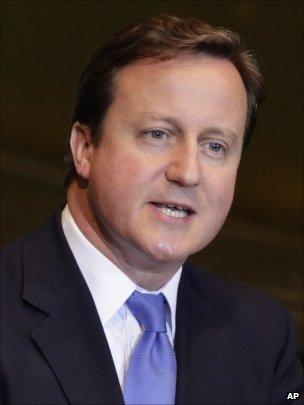Global economy: Britain out of Europe
- Published
- comments

Today's headlines have rightly focused on the starkness of David Cameron's message - his warning that the world could soon be staring down the barrel if eurozone governments don't tackle their debt and their lack of competitiveness.
However, just as significant - at least in the long term - is the fact that the British prime minister wrote his letter calling for action, external to save the world economy not with European leaders but to them.
Cameron's joint signatories were his Canadian, Australian, South Korean, Indonesian and Mexican counterparts. In other words, on the biggest macroeconomic policy question of the day Britain is not part of Europe, it is looking on from outside.
When Ireland first got into trouble the prime minister told his advisers that he was minded to give a speech calling on the eurozone to take the next logical steps towards integration.
He felt that his call would carry weight given that it would be coming from a British, Eurosceptic Conservative. George Osborne was amongst those who said that that was precisely why he should not make it - the risk was that it would look like another British lecture to a club we'd refused to join.
Besides, went the argument, the EU will muddle through - they always do. Finally the PM has delivered his message along with members of the Commonwealth and developing countries.
Britain's relationship with the EU is changing not because of any decision taken in Westminster or by the British people but thanks to "events, dear boy, events". Whether you find this a relief or a frustration is a good indication of whether you are a Euro-sceptic or a Euro-enthusiast.
If you feel a bit of both you are where the pollsters say most voters have been since Britain joined the Common Market - that is, someone who believes we cannot afford to be out but doesn't much like being in.
For years our political leaders have tried to change the attitudes of a country summed up by that old newspaper headline - "Fog in the Channel. Continent cut off." The headline these days should probably be just one word - "Fog" - although perhaps a second headline might help "No-one can see where they're going."
PS The prime minister clearly signalled in his Channel 4 interview how he would react to Lib Dem Cabinet ministers asking him to spend or Tories who might call on him to cut taxes:
"[B]ecause we were left such a massive budget deficit there isn't the opportunity to cut taxes and spend more money...you can't spend your way out of a debt crisis."
He also indicated that he is putting his faith in the Bank of England and supply side measures to stimulate growth:
"Interest rates are already incredibly low but I believe in monetary activism, using monetary policy where possible. But the most important thing we can do is actually to improve the productivity and the efficiency of our economy. Make it easier to employ someone. Make it easier to set up a business. Make it easier to grow, to build, to expand. Those are the steps that we're taking in a very, very aggressive growth plan."